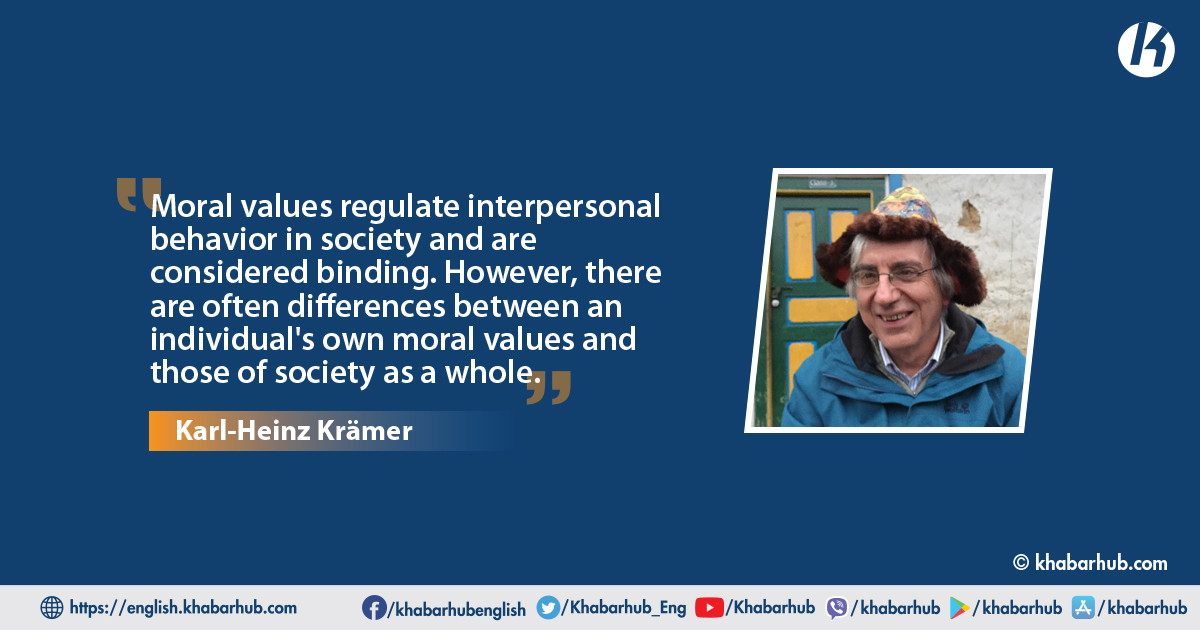Complaints about the lack of morality among Nepali top politicians have been around for a long time, but they have intensified in the late phase of the Oli government.
This may be particularly due to Prime Minister KP Oli’s behavior, but most other top politicians are not much behind him in this regard.
Moral values regulate interpersonal behavior in society and are considered binding. However, there are often differences between an individual’s moral values and those of society as a whole.
They require interpretation and are influenced by origin, culture, religion and one’s own experiences.
Since the adoption of the present constitution, Nepal has called itself a liberal secular state. In Articles 3 and 4 of this constitution, Nepal professes a pluralization of ways of life and social relations as well as the values that determine them.
Are Nepal’s top politicians meeting this requirement or are they still all too attached to political ideas of the past, which were oriented towards Hindu political criteria that ignored aspects of multi-ethnicity, multilingualism, and the diversity of Nepal’s religions and cultures?
The Hindu political upaya to preserve the power of a ruler
The classical Sanskrit scriptures make a conceptual distinction between dharma, i.e. religious-moral order, and artha, the political-worldly order.
Already with the 1959 Constitution and then even more so with the 1962 Panchayat Constitution, he explicitly made Nepal not a democracy but a monarchy; democratic and later sham democratic institutions acted as ornamental accessories.
According to the classical Hindu political conception, these two areas, dharma and artha, are only connected in the person of the ruler, ideally the raja, the king. For the latter, both realms coincide.
The religious duty of the ruler, his rajadharma, is the exercise of the political activity, artha. In this sense, the king was seen as the upholder and protector of dharma in his kingdom.
In order to successfully implement his policies, the king had the means of rajaniti at his disposal, according to Hindu conceptions of the state.
Niti literally means “good conduct or behavior”, but is also used in particular in the sense of “politics”. Rajaniti is the political behavior available to the king. In this, rajaniti is clearly distinguished from the honorable and morally high ideals of rajadharma.
Morality and awareness, which are so emphasized in rajadharma, are not considered in rajaniti; only success matters here.
The four main means (upaya) of classical rajaniti are saman (reconciliation, negotiation), danda (punishment, chastisement, coercion, attack), dana (gift, present, bribe) and bheda (division, betrayal, sowing discord among opponents).
In addition, there are three other means: maya (deception, fraud), upeksa (neglect, ignoring), and indrajala (accusation, pretense of false facts).
The upaya of rajaniti under the modern Nepali monarchy
The kings of modern Nepal have repeatedly resorted to these means to enforce their policies.
When democratic ideas first gained a stronger foothold in Nepal from 1951 onwards, this competed with King Tribhuvan’s efforts to restore the traditional position of the king after the end of the Rana period.
This became more pronounced after King Mahendra acceded to the throne in 1955 and especially with the introduction of the panchayat system.
His son Gyanendra tried to revive this royalist view with his two-stage coup from 2002 onwards.
Tribhuvan presented himself as a people-oriented monarch who promised the people democracy and general and free elections to a constituent assembly by 1953, which, as is well known, was not realized until 2008.
For the transitional period, he had a fairly democratic, albeit brief, constitution written, but in the course of the remaining four years of his rule, he increasingly de-democratized it using various changes.
He skillfully exploited the inexperience and disunity of the fledgling political parties and played them off against each other.
The two left-wing parties CPN-UML and CPN-MC were able to score a resounding victory thanks to their disciplined electoral alliance at the national and provincial levels under the unfortunately again more favored and non-inclusive direct voting system (FPTP).
BP Koirala, the outstanding party politician of the time, was thus deliberately ignored and his half-brother MP Koirala was favored, which led to a split in the Nepali Congress in 1953.
Mahendra continued this policy even more intensively, ignoring the Nepali Congress completely and entrusting smaller political parties with the government when he did not take the reins himself.
Already with the 1959 Constitution and then even more so with the 1962 Panchayat Constitution, he explicitly made Nepal not a democracy but a monarchy; democratic and later sham democratic institutions acted as ornamental accessories.
According to the preamble of the 1959 constitution, the people were already not free and sovereign citizens, but subjects of the ruler.
Mahendra deliberately destroyed the hope for the development of democracy that had begun with the 1959 elections by making fabricated accusations and feigning false facts.
The application of the upaya of rajaniti by Prime Minister KP Oli
After 30 years of banning political parties under the Hindu monarchy, Nepal needed another quarter of a century before democracy seemed to take root with the 2015 constitution.
With monarchy and a Hindu state, two of the biggest obstacles were abolished. Nepal professed to be a multi-ethnic and secular state that guaranteed separation of politics and religion. The establishment of a federal system was to contribute to better decentralization and facilitate adequate participation and inclusion of all sections of society.
The first elections at all three levels of this new federal system in 2017 produced clear political majorities after a very long time, which finally gave hope for political stabilization.
The two left-wing parties CPN-UML and CPN-MC were able to score a resounding victory thanks to their disciplined electoral alliance at the national and provincial levels under the unfortunately again more favored and non-inclusive direct voting system (FPTP).
This impression was reinforced by the merger of the two parties to form the NCP in May 2018.
At the latest since the Supreme Court actually defined Oli’s wanton breach of the constitution, which was intended solely to preserve his personal power and destroy his political opponents, as such, there has been a great deal of appeal to the prime minister’s moral obligation to resign immediately.
The utopian promises with which KP Oli began his term of office in spring 2018 were impossible to fulfill, but they at least gave the impression that he was prepared to introduce changes that could lead Nepal to a better future.
Very soon, however, it became clear that he was primarily concerned with his personal power. He only saw the rights of a prime minister but not the duties that came with that office.
In particular, he was not at all qualified for many of his tasks. He therefore repeatedly resorted to authoritarian measures that by far exceeded the legal limits he had been given. It became more and more clear that Oli saw himself as an heir to former royal power.
This also explained that he increasingly resorted to those upaya that are available to a Hindu ruler according to the classical scriptures in order to maintain his power.
His outward appearance, for example together with the Indian Prime Minister Modi in Janakpur, or his frequent appropriation of mythical Hindu ideals such as Ayodhya or Ram, corresponded to this.
Oli has hardly fulfilled any of the major and important tasks of his term in office. For example, he has still not implemented many of the steps given with a deadline to implement the constitution.
He seems to be fighting federalism and secularism rather than promoting them. Finally, under increasing pressure from his political opponents, he has single-mindedly put at risk what the people of Nepal have fought for so many decades, namely democracy and the 2015 constitution that guarantees it.
In particular, Oli must be accused of failure and indifference in the fight against the pandemic. He has repeatedly spread outrageous fairy tales about the immunity of Nepalis.
Apart from a radical and completely ruthlessly enforced lockdown, he has already come up with nothing in 2020.
Now the helpless Oli government cannot even provide emergency care to the suffering and dying people. At the same time, the Prime Minister has all the time in the world to intensify his power struggles at all levels of the political system.
Only this could explain why he rejects all moral behavior. He does not seem to care if the democratic development of the country is once again set back by years or decades because of his misbehavior.
Oli’s behavior escalated after opposition to this misguided policy was voiced even within his own ruling party. This resistance was not necessarily morally based, at least not on the part of his main inner-party opponent, PK Dahal; he too was primarily concerned with power.
But the faction around Dahal, MK Nepal and JN Khanal, looking to the future, also saw that Oli was leading the party into the abyss.
At the latest since the Supreme Court actually defined Oli’s wanton breach of the constitution, which was intended solely to preserve his personal power and destroy his political opponents, as such, there has been a great deal of appeal to the prime minister’s moral obligation to resign immediately.
But neither the court decision nor the clear defeat in the vote of confidence in the House of Representatives seems to have brought about a change in Oli’s mind.
It is possible that he has already identified himself so much with the upaya of rajaniti that he is supposedly entitled to that he has forgotten all sense of reality.
Only this could explain why he rejects all moral behavior. He does not seem to care if the democratic development of the country is once again set back by years or decades because of his misbehavior.
Or are the principles of Hindu politics still stronger than the democratic and ethical values of a modern Nepal?
(The views expressed in this article are the author’s own and do not necessarily reflect Khabarhub’s editorial stance)









Comment